

Discover more from Abe Murray | AlleyCorp / Deep Tech
How do I become a great PM?
Also - can ChatGPT outperform amazing PMs at answering this question?
People often ask me “how do I become a great PM?”
They ask because they know I’ve built product teams from 0-20+ multiple times at Google from Maps to Android to Google Research, then spent five years building out Verily’s product teams and value based care business unit. My teams and I shipped lots of product and built businesses with $XXXM in revenue multiple times.
So - what gems do I have to share from all of this experience? Read on - I’ll get to them!
But first I wondered if all my smart friends had better ideas!
So I asked 50+ amazing product leaders (and friends) for their go-to ideas and insights. Awesome responses!
I’ll share their gems at the end too!
Before that - one of them (thanks Shawn!) suggested I ask ChatGPT for its thoughts. Hey, thought I, that’s a clever thing to do!
Can ChatGPT outperform amazing PMs at this question?
So I asked ChatGPT (4, the best number, so far at least) for its suggested approach to being a kick ass product leader.
Here are some of ChatGPT’s thoughts on product leadership:
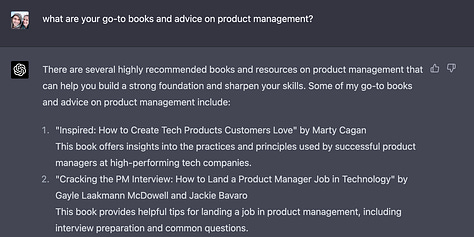
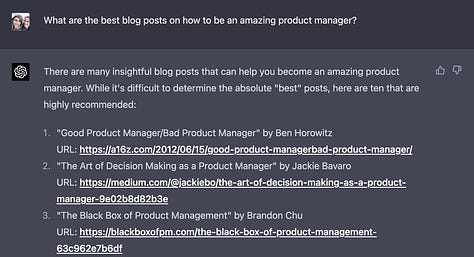
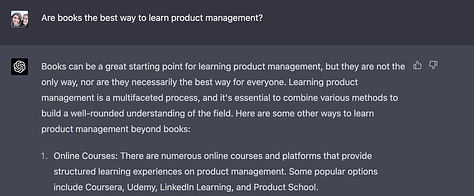
A few thoughts:
This is easily a 90% answer vs. all us “smart” folks
GPT started with books - more on that in a minute
It lead with my hands-down fave blog on PM’ing by @bhorowitz ❤️
What did the LLM get wrong? It defaulted to books - and an ok list at that - but didn’t give good ‘advice’. The 10x PMs I know respond to “what books to read on PM” with a list of books AND advice to start somewhere other than books. ChatGPT is no 10Xer … yet. But - with additional prompting - it got to that answer too, and an ok response all around.
At this point I’m pretty sure ChatGPT + generic PM delivers a 10X PM response to the original question “how do I become a great PM”. Our PM days may be cooked 🤷
Ok - you can probably stop here. ChatGPT basically won the game, go ask it those questions, read all that stuff, and you’ll be fine. We’re done here!
Curious what human meat-sacks think about how to be a great PM?
Still reading? Ok then… my smart product friends had a range of responses starting with all the obvious books: Zero to One, Competing Against Luck, Build, Working Backwards, Sprint, Built to Last, Inspired, Good to Great, Product Leadership, Reboot, Effective Executive, Crossing the Chasm and more.
The PMs I admire most said “books aren’t the right answer here.” They pointed at blog posts, newsletters, articles and frameworks. On this list we have Reforge, Lenny’s Newsletter, Gibson Biddle, as well as oldie and goodies like Ken Norton and Ben Horowitz. They all said “learn by doing” - build / ship / execute.
An amazing leader (and vet - former marines) has an article he wrote laying out his thoughts - working on permission to share with you all. Collection of all the above.
It’s worth reiterating - these are great answers - but basically what ChatGPT came up with as well. Similar list of books, blog posts, articles, and overall advice wrt “learn by doing”.
Great stuff all around - thanks smart product friends! You’re the best - and still - barely - better than ChatGPT. Your jobs are safe for another 6 months at least.
Am I any smarter than ChatGPT or these awesome humans?
You know the answer - we apply Betteridge’s Law here. No, I am not smarter. I do have my own take - pasted below - that aligns with the above. It’s my flavor - take it or leave it:
Abe’s compiled thoughts on product leadership
I don’t start with books on product management, though I've read a few [1] and they are ok for talking about tactics of the product management process and thinking more broadly.
Here's what I do love:
Product market fit and strategy - my two favorite books on this are Zero to One and Clayton Christensen's Competing Against Luck - I don't like the JTBD consulting businesses but really like the principles. This is all about product market fit - something I'm sure you know well - but many at Google and elsewhere forget as they grow. Know what your customer actually needs and why your product is being hired to do the job for them. (And in Thiel's case - know what you uniquely know, that others don't, that gives you an unfair advantage.)
Process and documentation - I love Amazon's working backwards documents and approach and PR FAQs for product docs as an approach to set and communicate vision. Also basically what I learned from Marissa on her team at Google. Write the press release. Know your customer and what you're going to deliver for them. Then do it. Doesn't need to be a doc - can communicate in a deck or on a whiteboard - but be very clear in what success looks like.
For product reviews, I find simple kindergarten questions work very well - 'why are you building this' / 'who is your customer' / 'what do they need' / 'how are you measuring that' / 'why is that the right measurement' etc - just dig in and keep it simple.
For product metrics, I find simple dashboards work very well - avoid bullshit metrics, know what success is, measure it and manage against it. I have always found teams are measuring things wrong when I dig in and ask a series of questions about users, usage, margins etc.
For frameworks, I like first principles - I have collected a bunch of useful frameworks through the years from agile to various HBS things to all the other stuff. Simple is good, maybe I’ll share my list later - but I often find first principles are even better than frameworks [2].
What is a product manager - I always liked Ken Norton's take on this - especially recognizing that you have to remember PMs are expendable and need to be amazing or GTFO. I also liked Ben Horowitz's good PM / bad PM article - even though he says it's old now - I like the 'bad PMs have excuses'.
Product management is a combination of product market fit (know the customer), focus (know what to build and what not to build), communication and leadership (make sure the team knows what they're doing and why), execution (get shit done on time) and business and sales (we better have a path to make money or why are we even here). I don't think there's magic to it, and I think the simpler you make it the more successful you are.
In my experience big teams with lots of PM, UX, UER, etc etc lose sight of figuring out what the customer wants and will pay for and doing that thing. This is why startups succeed - if they get this wrong they die - while bigger companies can play around for a long while without getting this right.
Any successful founder is a de facto product manager - you wrangled the PMF beast, you built a business, you made customers happy, you shipped and won.
tldr - PM isn’t a book, it’s a practice. Do stuff. Ship stuff. Learn as you do it. Learn from others. Know your customer better than anyone else.
Now you know how to be a great PM!
You can pick from any one of “Abe’s brilliant PM buddies” | “ChatGPT” | “Abe’s PM cheat sheet” and you’ll probably wind up somewhere good. Do all three and you win all the points. Building something amazing from scratch? Let us know at AlleyCorp Robotics - we back amazing folks right at the start of their journey.
Thanks for reading,
~Abe
PS - Follow us everywhere for more robot insights - Twitter @abemurray and LinkedIn @Abe Murray
[1] Other books on the list - Product Leadership is an ok resource for a VP of product to skim through once. I think The Effective Executive - as old as it is - is super useful for running teams, including product teams - and made far more sense to me after I'd built multiple PM orgs to 20+ folks, leading engineering teams of 100+ folks. The combination of Drucker + Reboot by Colonna are my go-to books on being an amazing leader in general 😄. Read all the other obvious books too - leaders are readers 📘.
[2] Should I write an article on frameworks I’ve collected? Let me know - email me at abe at arv dot team, or reply to this newsletter. Sneak peek - one of my favorite is “3 question management” - 1) do you have a plan, 2) is it working, 3) are you ahead or behind? Simpler is gooderer!
Final postscript: here is the full (and simple) ChatGPT conversation
I’m sure folks can do better - I was amazed at how very simple questions generated a pretty good outcome! ie - I feel like ChatGPT is the new “let me Google that for you” response to a noobie’s guide to anything!
What are your go-to books and advice on product management?
There are several highly recommended books and resources on product management that can help you build a strong foundation and sharpen your skills. Some of my go-to books and advice on product management include:
"Inspired: How to Create Tech Products Customers Love" by Marty Cagan This book offers insights into the practices and principles used by successful product managers at high-performing tech companies.
"Cracking the PM Interview: How to Land a Product Manager Job in Technology" by Gayle Laakmann McDowell and Jackie Bavaro This book provides helpful tips for landing a job in product management, including interview preparation and common questions.
"The Lean Startup: How Today's Entrepreneurs Use Continuous Innovation to Create Radically Successful Businesses" by Eric Ries This book introduces the Lean Startup methodology, which emphasizes rapid experimentation and learning to build successful products.
"Sprint: How to Solve Big Problems and Test New Ideas in Just Five Days" by Jake Knapp, John Zeratsky, and Braden Kowitz This book teaches the Google Ventures design sprint process, a practical method for validating ideas and solving problems quickly.
"Product Management for Dummies" by Brian Lawley and Pamela Schure This beginner-friendly book covers the basics of product management, including roles, responsibilities, and best practices.
"The Product Manager's Survival Guide: Everything You Need to Know to Succeed as a Product Manager" by Steven Haines This guide provides practical advice and techniques for excelling as a product manager, including communication, decision-making, and prioritization.
"Hooked: How to Build Habit-Forming Products" by Nir Eyal This book explores the psychology behind habit-forming products and offers a framework for designing products that engage users.
"The One Thing: The Surprisingly Simple Truth Behind Extraordinary Results" by Gary Keller and Jay Papasan This book emphasizes the importance of focus and prioritization in achieving success, which is highly relevant for product managers.
In addition to these books, there are numerous blogs, podcasts, and online resources that offer valuable insights into product management. Attending industry conferences, joining product management communities, and networking with other professionals can also help you expand your knowledge and skills in the field.
Are books the best way to learn product management?
Books can be a great starting point for learning product management, but they are not the only way, nor are they necessarily the best way for everyone. Learning product management is a multifaceted process, and it's essential to combine various methods to build a well-rounded understanding of the field. Here are some other ways to learn product management beyond books:
Online Courses: There are numerous online courses and platforms that provide structured learning experiences on product management. Some popular options include Coursera, Udemy, LinkedIn Learning, and Product School.
Workshops and Bootcamps: Participating in hands-on workshops or enrolling in bootcamps can help you gain practical knowledge and real-world experience in a condensed time frame.
Industry Conferences and Meetups
What are the best blog posts on how to be an amazing product manager?
There are many insightful blog posts that can help you become an amazing product manager. While it's difficult to determine the absolute "best" posts, here are ten that are highly recommended:
"Good Product Manager/Bad Product Manager" by Ben Horowitz URL: https://a16z.com/2012/06/15/good-product-managerbad-product-manager/
"The Art of Decision Making as a Product Manager" by Jackie Bavaro URL: https://medium.com/@jackiebo/the-art-of-decision-making-as-a-product-manager-9e02b8d82b3e
"The Black Box of Product Management" by Brandon Chu URL: https://blackboxofpm.com/the-black-box-of-product-management-63c962e7b6df
"How to Work with Software Engineers" by Ken Norton URL: https://www.kennorton.com/essays/how-to-work-with-software-engineers.html
"10 Tips for Product Managers to Prioritize Features" by Melissa Perri URL: https://melissaperri.com/blog/2016/12/28/10-tips-for-prioritizing-features
Subscribe to Abe Murray | AlleyCorp / Deep Tech
AlleyCorp is investing in deep tech with a focus on advanced manufacturing, aerospace, and robotics 🤖 🦾 teams solving the world’s problems. We are based in Boston and NYC.

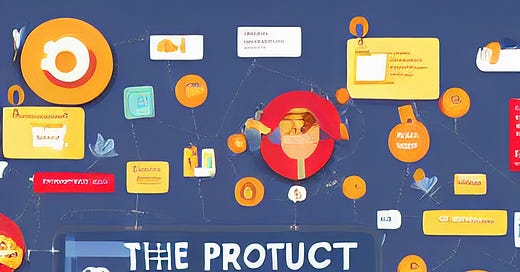




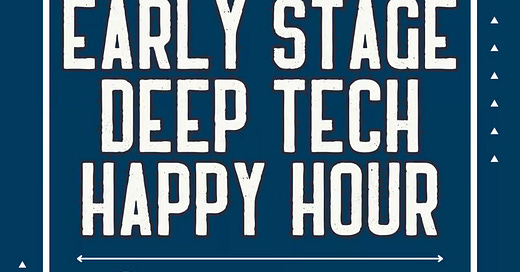

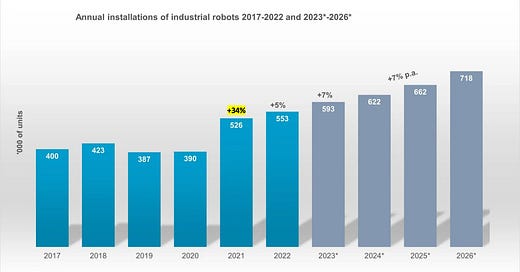



"you have to remember PMs are expendable and need to be amazing or GTFO." is exactly what I told my students yesterday. I am not sure I am exactly selling them on the career, but that's OK
Also, where is "Escaping the build trap"?